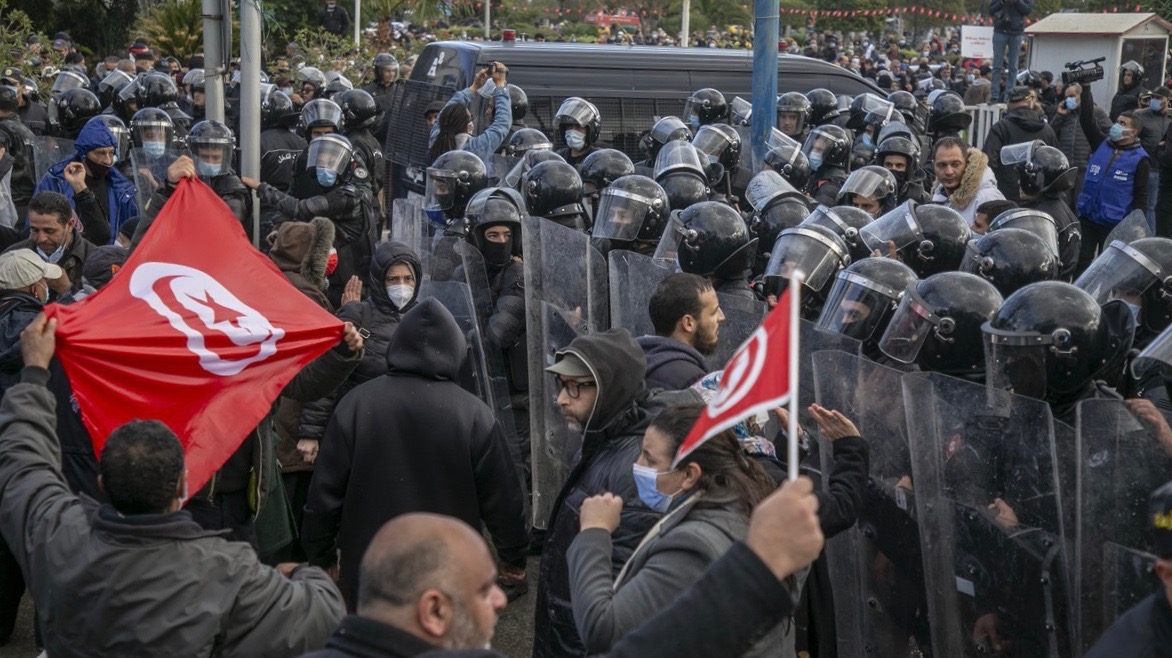On Tuesday, January 18, over 20 Tunisian human rights groups and civil society organizations held a press conference to repudiate the recent crackdown on civil liberties and human rights in the country by the regime of president Kais Saied. The press conference was held days after Tunisian security forces violently repressed anti-government protesters on the 11th anniversary of the Tunisian revolution.
On January 14, despite the current COVID-19 surge and associated restrictions, thousands of protesters participated in mass demonstrations in capital Tunis. In addition to commemorating the anniversary of the revolution, they denounced current attacks on Tunisian democracy principally the president’s takeover of virtually all executive and legislative powers in what critics and opposition parties called an “unconstitutional presidential coup” last year. The protesters were attacked by the security forces with tear gas, stun grenades and water cannons. Dozens were arrested.
On July 25 last year, president Saied suspended the parliament, dismissed the prime minister and the government and assumed all powers. He continued to consolidate his rule in the subsequent months. In September last year, he issued a presidential decree giving himself additional authority to rule by decrees and suspended parts of the Tunisian constitution. He has since extended the parliament’s suspension. He also recently announced a constitutional referendum to be held in July this year to replace the present constitution put in place following the 2011 revolution. He has announced fresh general elections to be held later in December. Opposition parties, human rights groups and civil society activists have strongly condemned that these decisions that were made without consultations with any stakeholders.
The National Union of Tunisian Journalists (SNJT), Tunisian Forum for Economic and Social Rights, Tunisian Association of the Democratic Women and Lawyers Without Borders were among the organizations present in Tuesday’s press conference. The organizations jointly held president Saied and his interior minister, Taoufiq Sharaf El-Din, responsible for the violence perpetrated against protesters. They called on the president to “publicly apologize for the assaults committed against the demonstrators on January 14.” They claimed that “the Tunisian authorities are seeking to control Tunisia with undemocratic and civil mechanisms that will only fuel anger against the security establishment and deepen the crisis between citizens and the state.” They further added that the security forces are committing “arbitrary practices that affected hundreds of Tunisians, causing severe physical and psychological damage to dozens of them.”
The organizations urged the Tunisian judiciary to investigate cases of violence committed by the security forces against protesters. The state crackdown has also been repeatedly denounced by the principal leftist opposition party in Tunisia, the Workers’ Party, which said that the government maliciously used COVID-19 restrictions to crack down on the protests. The party also accused the president of unilaterally changing the date of the revolution’s anniversary without consulting Tunisians, thus disrespecting the revolution’s memory. It further called for the immediate and unconditional release of all those arrested during the protests and demanded action against the security personnel responsible for the violence.
The demonstrations held last Friday commemorated the anniversary of the 2011 uprising which overthrew the authoritarian regime of former president Zine El Abidine Ben Ali. The protesters were surrounded from all sides by the security forces to prevent them from reaching the central Habib Bourguiba street in Tunis, one of the main sites for protests and rallies. The street reportedly had massive security deployment and all roads leading to it were cordoned off.
Speaking to reporters, the head of the Tunisian National Journalists’ Union (SNJT), Yassine Jelassi, said, “a police and security mentality is running the state… Tunisia has become a country which suppresses freedoms. It is clear that freedoms are threatened and face an imminent peril.”
The current Tunisian regime is also facing international criticism. On Tuesday, the International Trade Union Confederation (ITUC) expressed “serious concern over acts of anti-union repression by the authorities under the control of Tunisian President Kais Saied.”
ITUC General Secretary Sharan Burrow noted that the government has repeatedly refused requests from Tunisia’s biggest trade union, Tunisian General Labor Union (UGTT), to work together on problems facing the country. It has instead gone ahead with a campaign of violence and repression to persecute and silence its critics and opposition. Burrow said in a statement that “the ITUC stands with the UGTT and its members and will do all we can to support them, to stop the repression and to ensure that the country does not simply bend to the diktats of the IMF, which would only increase poverty and unemployment.”
The rising unemployment and poverty and problems like corruption and foreign debt stand in complete contrast to promises made by president Saied while taking over extraordinary powers last year. He had justified the takeover by promising to revive the struggling economy, improve people’s lives and tackle issues like corruption and substandard healthcare. The country continues to fare poorly on all these fronts after almost six months, and the situation is worsening with each passing day. Meanwhile, the president has extended the state of emergency imposed after a 2015 attack by another month till February 18.





